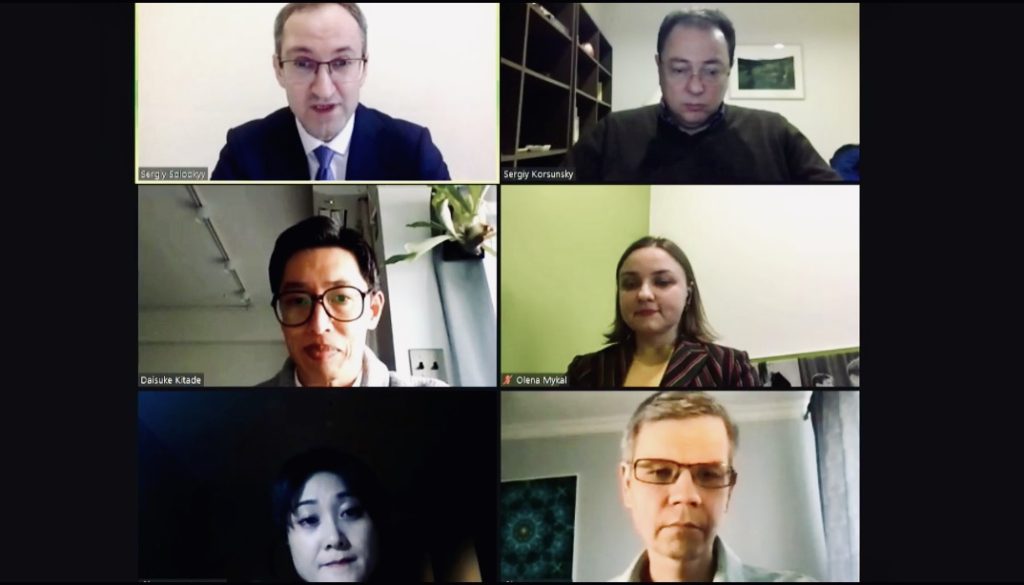The New Europe Center held the last out of three Ukrainian-Japanese online discussions “Ukraine-Japan-EU trade connectivity: mutual impact and new opportunities”. During the event the respective analytical commentary by Daisuke KITADE, Researcher, Mitsui & Co. Global Strategic Studies Institute (Japan), and Sergiy SOLODKYY, First Deputy Director, New Europe Center (Ukraine) was presented.
During this week the New Europe Center held also two more online events: “US-Japan security alliance: possible tips for Ukraine” and “How to rebrand Ukraine in Japan and vice versa?”. The online discussions were organised following the results of the “Asia Strategy in Action. The Role of Ukraine-Japan Cooperation” forum.
Participants points at the discussion:
Moderator: Sergiy Solodkyy, First Deputy Director, New Europe Center
- There is a huge interest from Japan to use the opportunities of Ukraine and Ukrainian economy, and we see a lot of interest from Ukrainian businesses to increase their presence in Japanese market. We see how Ukrainian Embassy in Japan is active, we hear a lot of great news related to trade-economic relations that make us think optimistic.
- Today the Ministry of Foreign Affairs of Japan has made a special present for us, because Japan announced the resolution of one problem dating back to the Soviet Union times.
- When speaking about the interconnection and the triangle of EU-Ukraine-Japan cooperation, it would be quite logical that in this triangle there would be a free trade zone between Ukraine and Japan. There is the beginning of a discussion on this topic, which is also important.
Daisuke Kitade, Researcher, Mitsui&Co. Global Strategic Studies Institute
- The Ministry of Foreign Affairs of Japan has announced that on March 22 there will be a new round of negotiations on double taxation avoidance. It will solve the problem and Japanese companies will not have to pay more taxes than the companies from other countries.
- Association agreement between Ukraine and EU and the economic part of it has had a positive effect on increase of trade between Ukraine and Japan. Investments of Japan to Ukraine will gradually grow, following the increase of trade. Japanese don’t like risks, they begin with trade then they go to investments. Trade growth is a good sign for the growth of investments.
- As for triangular relations Japan-Ukraine-EU, well-coordinated investment program between Japan and the EU (connectivity) is expected. Japan and the EU have signed a memorandum “The Partnership on Sustainable Connectivity and Quality Infrastructure between the European Union and Japan” in September 2019. In that memorandum the high priority region for building the connectivity is the Eastern Europe and also the Western Balkans and Central Asia. I have great hopes for the EU-Japan projects in those regions, including Ukraine. Connectivity is a flow of people, energy, cyber space. There can be many lucrative projects.
- Bad business climate is killing everything and no agreement will help it. For Ukraine the issue of reforms is crucial, especially concerning the judicial system and tackling corruption.
- Ukraine and Japan need to know more about each other. The dialogue should continue.
Sergiy Korsunsky, Ambassador Extraordinary and Plenipotentiary of Ukraine to Japan
- After our meeting with the main six trade branches of Japan, it turned out that Japanese companies pay more percentage of taxes than European ones. Ukraine is still within the Convention of 1986. Our Ministry of finance instantly responded, the Ministry of Foreign Affairs of Japan outlined this as a high priority. They reestablished the online consultancy.
- I also said that we need a free trade agreement. And Japanese counterpart is very cautious about that. Free trade agreement is very important. Japan is in the very heart of a network of free trade agreements with the whole world. Its unique placement, where Japan is in trans-Pacific, trans-Atlantic and trans regional dimensions, has a free trade regime: with the EU, Great Britain, Canada. We are already very close legally with Japan, that is why the negotiations about free trade don’t have to be long and difficult. Why do we need this? Through Japanese companies we will be able to enter another level of trade, transnational. For this reason, cooperation with Japan has a double interest for us.
- Ukraine shouldn’t set the goal to fill Japanese market, which is extremely competitive as you can find products of the best quality from all over the world. It is difficult to sort out the competitors and bring new products there. Japan is important for Ukraine as a global, powerful trade nation in the world, which can help us have much wider markets in the region. Japan buys goods not only for themselves and that gives us the opportunity to benefit from this.
- As for European Union, it’s an agreement of connectivity. The Japanese expert is preparing a report and the proposals in terms of which areas Japan and EU can implement projects in Ukraine, including spheres of infrastructure, hydrogen.
- Talking about investments, except for 2 industrial Japanese projects, there are projects in the agricultural sphere, such as Sumitomo, CJ (has investments in agriculture). Like any other foreign investors, they face problems in Ukraine and we are trying to resolve them.
- Japanese scrutinize everything in order not to have negative experiences. Japanese companies want to work, have proper conditions. They will honestly pay taxes, invest into social infrastructure and they will be reliable partners. The benefits for us are not only money, but also corporate culture. It shows us that we have to move from offshore investments to more strategic.
- We focus more on the food industry, although other spheres are also quite popular. Do you know how popular our plastic toys are?
- We cannot be more successful abroad than we are successful at home. Ukraine has to demonstrate its internal strength, our quality, that we value ourselves, then it will be much better to promote it. Ukrainian business people should do their best, so that consumption in Ukraine is successful.
Atsuko Higashino, Associate Professor, University of Tsukuba
- The usefulness of Mr. Kitade’s and Mr. Solodky’s analytical commentary is that it outlines the differences between Ukraine’s and Japan’s approaches to free trade, as well as Ukraine’s and Japan’s trade volumes. The Japanese approach is to first expand trade and only then look at free trade opportunities. The Ukrainian side seeks free trade zones. The difference between these two approaches is somewhat reminiscent of the dilemma “What happened before – chicken or egg?”.
- I understand the Japanese precaution before starting a large trade with someone. At the same time, I agree that the Japanese administration is sometimes too cautious. It may be worthwhile to introduce a two-pronged approach – first to constantly promote the free trade agenda and at the same time expand trade between us.
- Ukraine-Japan potential agreements and renewal of the association agreement between Ukraine and the EU should go hand in hand. Trade between our countries is already affected by this multinational agreement.
- It is worth considering whether it would be more successful to remain in a bilateral agreement between Ukraine and Japan or to consider a multilateral free trade area between Japan and other Eastern European partners, such as Moldova and Georgia. Bilateral or multinational formats can be a topic for discussion. Our colleagues in the Japanese government must also think about the geopolitical implications and benefits of the free trade area.
- Connectivity is the use of many different connections. The Japanese government should renew its new ties with Ukraine with double and triple force, and not focus too much on the Western Balkans.
- She is a supporter of the idea that the closer Ukraine is to the EU, the closer it is to Japan, but it is necessary to expand Ukrainian-Japanese ties and spread political and economic messages.
Olena Mykal, Senior Lecturer, National University of Kyiv-Mohyla Academy, PhD (Waseda University)
- Over the decade, the EU-Japan dialogue has developed as much as Ukraine-EU dialogue. The dialogue between Ukraine and Japan developed more slowly.
- My point of view, when we`re talking about trade and markets, which are key to investment and further cooperation, including what is happening now (namely the cooperation between China and Central and Eastern European countries “18 + 1”), we must emphasize that Ukraine shares democratic values, freedom of speech and human rights with Japan and the EU.
- We must be proactive in Ukraine. Yes, there are already Japanese experts conducting research projects that will cover Ukraine and Azerbaijan and Japan in the framework of this partnership – it’s one thing. Another is the Convention on Double Taxation, which should have been resolved in the 90s, but we are talking about involving people in these problems.
- Ukrainians must have the desire and political will to do certain things. Ukraine as a system, as a state, should be more proactive and should propose projects for the EU and Japan, which can be of interest to all three. Ukraine needs to change its perception from a “junior” partner to a real partner for cooperation.
- Ukraine has great potential for relations between Ukraine-Japan and the EU. We are interested in this cooperation and Ukrainian participation, but we must be more proactive, learn to think and be pragmatic.
Yuri Lutsenko, Partner, COIN / consulting integrated
- COIN team has been promoting Ukrainian food and agricultural products in Japan for 5 year and 4 out of these 5 we are only focused on Japan.
- The most practical vector for Ukrainian food and agricultural products for export in Japan is honey. Ukrainian honey is growing in volume in export to Japan. Pandemic hasn’t hit it so negatively. Honey is a highlight of our food and agricultural export in Japan.
- We have a huge potential in frozen berries, beans, oil and traditional cereals. It will grow if the exporters will be active, if they maintain the Japanese specifications. This applies also to agricultural goods.
- Among the package goods there is a great potential for confectioners. Ukrainian sweets, croissants and bakeries are getting more and more attention from importers. Big companies like AVK, Roshen, Zhytomyrsky lasoschi, Yarich are getting more and more attention from Japan. When big companies attract attention and start moving in that direction, they become leaders and examples for smaller companies.
- The problem of Ukraine is that a lot of Ukrainian goods are exported not from Ukraine. Japanese look at the origin of the products. The exporters of Ukrainian goods in the honey industry and in the berries industry are mostly oriented towards the EU through proximity, Association agreement, and consumer habits. European countries reexport Ukrainian goods to Japan, as Ukrainian honey is packed in Poland and berries are packed in Italy. There is a component of trust from Japanese to European products, and the element of faith from Ukrainian exporters to Japan versus exports to Europe.
- Not many Ukrainian exporters are interested in Japan. According to our assessment, if we take about 2000 Ukrainian exporters in food and agro, only 400-500 are doing the right way (promote, participate in exhibitions, surveys, studies, follow-ups with their importers). Only half of them are potential exporters to Japan, and that’s not much.
- Why Ukrainian exports to Japan are so small? There are two factors: the first marketing factor is trust from Japan and faith in the result from Ukrainian side. And the second more pragmatic and mathematical factor is the regulatory environment.
- In order to give publicity to the Japanese direction of Ukrainian exports, we should talk about this more. Promotion of our work is very important.
Watch the event in English here:








